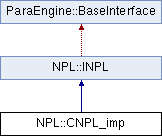implementation of INPL More...
#include <NPL_imp.h>

Public Member Functions | |
| virtual INPLRuntime * | GetNPLRuntime () |
| the core NPL runtime interface. More... | |
| virtual int | activate (const char *sNPLFilename, const char *sCode, int nCodeLength) |
| [thread safe] activate the specified file. More... | |
| virtual int | StartService (const char *pCommandLine) |
| start the NPL service. More... | |
| virtual void | StopService () |
| stop the NPL service. More... | |
| virtual void | FrameMove (float fElapsedTime) |
| desc: Move all object's mental states to next time the following global states are defined specific to this simulator (1) for all NPC type object, "npc_name = object.identifer();" is passed to the neuron file as input. More... | |
| virtual void | SetGameLoop (const char *scriptName) |
| reset the game loop script. More... | |
| virtual void | SetGameLoopInterval (float fInterval) |
| set the game loop activation interval. More... | |
| virtual void | AddNPLCommand (const char *sCommand, int nLength=0) |
| add an NPL command code to the (main state's) pending list to be processed in the next frame move cycle. More... | |
Detailed Description
implementation of INPL
Member Function Documentation
§ activate()
|
virtual |
[thread safe] activate the specified file.
It can either be local or remote file.
- Parameters
-
pState the source runtime state that initiated this activation. If pState is NULL, the main runtime state is used. sNPLFileName a globally unique name of a NPL file name instance. The string format of an NPL file name is like below. [(sRuntimeStateName|gl)][sNID:]sRelativePath[]
the following is a list of all valid file name combinations: "user001@paraengine.com:script/hello.lua" – a file of user001 in its default gaming thread "(world1)server001@paraengine.com:script/hello.lua" – a file of server001 in its thread world1 "(worker1)script/hello.lua" – a local file in the thread worker1 "(gl)script/hello.lua" – a glia (local) file in the current runtime state's thread "script/hello.lua" – a file in the current thread. For a single threaded application, this is usually enough. "(worker1)NPLRouter.dll" – activate a C++ or C# dll. Please note that, in windows, it looks for NPLRonter.dll; in linux, it looks for ./libNPLRouter.so "plugin/libNPLRouter.dll" – almost same as above, it is recommented to remove the heading 'lib' when loading. In windows, it looks for plugin/NPLRonter.dll; in linux, it looks for ./plugin/libNPLRouter.so
- Parameters
-
sCode it is a chunk of pure data table init code that would be transmitted to the destination file.
- Note
- : pure data table is defined as table consisting of only string, number and other table of the above type. NPL.activate function also accepts ParaFileObject typed message data type. ParaFileObject will be converted to base64 string upon transmission. There are size limit though of 10MB. one can also programmatically check whether a script object is pure date by calling NPL.SerializeToSCode() function. Please note that data types that is not pure data in sCode will be ignored instead of reporting an error.
- Returns
- : NPLReturnCode. 0 means succeed.
Implements NPL::INPL.
§ AddNPLCommand()
|
virtual |
add an NPL command code to the (main state's) pending list to be processed in the next frame move cycle.
[thread safe] This function is thread-safe by using a mutex internally.
- Parameters
-
sCommand command to call in the next frame move. nLength length in bytes. if 0, we will calculate from the sCommand.
Implements NPL::INPL.
§ FrameMove()
|
virtual |
desc: Move all object's mental states to next time the following global states are defined specific to this simulator (1) for all NPC type object, "npc_name = object.identifer();" is passed to the neuron file as input.
(1.1) for all OPC type object, "opc_name = object.identifer();" is passed to the neuron file as input. (2) for GUI sensor type object, "sensor_name = object.identifer();" is passed to the neuron file as input. (2.1) for GUI sensor type object that accept key strokes, an additional "keystring = keystrings" is passed as input.
– execute NPL network logic for one pass
Implements NPL::INPL.
§ GetNPLRuntime()
|
virtual |
§ SetGameLoop()
|
virtual |
reset the game loop script.
the game loop script will be activated every 0.5 seconds see SetGameLoopInterval() to change the default interval Please keep the game loop concise. The default game loop is ./script/gameinterface.lua
Implements NPL::INPL.
§ SetGameLoopInterval()
|
virtual |
§ StartService()
|
virtual |
§ StopService()
|
virtual |
The documentation for this class was generated from the following files:
- Client/trunk/ParaEngineClient/NPL/NPL_imp.h
- Client/trunk/ParaEngineClient/NPL/NPL_imp.cpp
 1.8.12
1.8.12